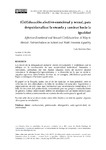Mostrar o rexistro simple do ítem
(Co)educación afectivo-emocional y sexual, para despatriarcalizar la escuela y caminar hacia la igualdad
| dc.contributor.author | Ferreiro Díaz, Lola | |
| dc.date.accessioned | 2019-02-19T12:25:55Z | |
| dc.date.available | 2019-02-19T12:25:55Z | |
| dc.date.issued | 2017 | |
| dc.identifier.citation | Atlánticas. Revista Internacional de Estudios Feministas 2017, 2: 134-165 ISSN: 2530-2736 | es_ES |
| dc.identifier.issn | 2530-2736 | |
| dc.identifier.uri | http://hdl.handle.net/2183/21853 | |
| dc.description.abstract | [Resumen] Las raíces de la desigualdad incluyen claves estructurales y simbólicas que se reflejan en la construcción de una subjetividad individual -femenina y masculina-, presidida por dos díadas situadas fuera de nuestro alcance consciente: la abnegación/egocentrismo, y la dirección en la que se emite el impulso agresivo, auto/hetero. Si éstas no se corrigen, difícilmente podremos llegar a conseguir relaciones igualitarias. El papel de la Escuela, junto con el de las familias, es fundamental, pero se enfrenta con dos dificultades: la falta de medidas estructurales -legislativas y organizativas, en este caso- que promuevan una intervención coeducativa, y la falta de recursos del profesorado, acrecentada por sus propias contradicciones de género. Ambas dimensiones deben ser abordadas de un modo efectivo para permitir la referida intervención en materia de educación para la igualdad. En este artículo se analizan todas estas dificultades y se intenta aportar algunas ideas para su resolución | es_ES |
| dc.description.abstract | [Abstract] The root of inequality includes symbolic and structural keys reflected through the construction of an individual subjectivity ‒feminine and masculine‒, which has been ruled by a duality placed beyond our conscious reach: the abnegation/egocentrism, and the direction through which the aggressive impulse is emitted, auto/hetero. Hardly would we achieve equal relationships if this duality is not corrected. The school’s and family’s roles are fundamental. However, they have to face two difficulties: the lack of structural measures -both organizational and legislative in this case- that could promote a co-educative intervention; and the lack of resources of the teaching staff‒increased because of their own gender contradictions. Both scenes must receive an effective approach in order to allow the above-mentioned intervention in school matter for equality. This article analyses all these difficulties and tries to provide several ideas with the aim of their resolution | es_ES |
| dc.language.iso | spa | es_ES |
| dc.rights | Atribución-CompartirIgual 3.0 España | es_ES |
| dc.rights.uri | http://creativecommons.org/licenses/by-sa/3.0/es/ | * |
| dc.subject | Coeducación | es_ES |
| dc.subject | Patriarcado | es_ES |
| dc.subject | Abnegación | es_ES |
| dc.subject | Autoagresividad | es_ES |
| dc.subject | Rol profesional | es_ES |
| dc.subject | Co-education | es_ES |
| dc.subject | Patriarchy | es_ES |
| dc.subject | Abnegation | es_ES |
| dc.subject | Aauto-aggressiveness, | es_ES |
| dc.title | (Co)educación afectivo-emocional y sexual, para despatriarcalizar la escuela y caminar hacia la igualdad | es_ES |
| dc.title.alternative | Affective-Emotional and Sexual (Co)Education: a way to Abolish Patriarchalism in School and Walk Towards Equality | es_ES |
| dc.type | info:eu-repo/semantics/article | es_ES |
| dc.rights.access | info:eu-repo/semantics/openAccess | es_ES |
| UDC.journalTitle | Atlánticas – Revista Internacional de Estudios Feministas | es_ES |
| UDC.volume | 2 | es_ES |
| UDC.issue | 1 | es_ES |
| UDC.startPage | 134 | es_ES |
| UDC.endPage | 165 | es_ES |
| dc.identifier.doi | https://doi.org/10.17979/arief.2017.2.1.1771 |






